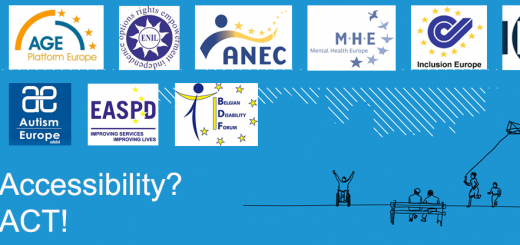“What if all people had to do a test to vote?” – Inclusion Europe board member Harry Roche speaks to EU leaders at Disability Parliament
Around 800 delegates including several high-profile EU leaders and the record number of 200 persons with intellectual disabilities: This was the audience our board member Harry Roche adressed at the 4th European Parliament of Persons with Disabilities, which took place on Wednesday. He spoke about a topic he has been passionately campaigning for – voting rights.
“Imagine everyone would need to take a test to see if they are ‘fit to vote’. How many people would pass that test?” Harry Roche started off his speech, alluding to the case of a Spanish woman with intellectual disabilities who had been denied the right to vote.
Even though the Spanish law will be changed following pressure from the disability movement, “in 10 countries of the EU laws on legal capacity still deny people with intellectual disability the vote” – and this is just one type of blatant discrimination of people with intellectual disabilities face in Europe.
In 10 countries of the EU people with intellectual disability are denied the right the vote
Harry Roche
“The United Nations have expressed deep concern that persons with disabilities cannot excercise their right to vote”, Harry Roche reminded the audience which included EU leaders such as the European Parliament’s President Antonio Tajani, Vice President Dimitrios Papadimoulis, Employment and Social Affairs Commissioner Marianne Thyssen, the President of the European Economic and Social Committee Gerogios Dassis, and the European Ombudswoman Emily O’Reilly.
Harry Roche listed several forms of this ongoing discrimination, for example:
- laws on guardianship and the right to make decisions,
- laws about who can join organisations, hold responsible positions or be elected
- indirect discrimination like the lack of easy-to-read information about elections or the fact that parties often do not reach out to people with intellectual disabilities.
“If there is the political will, the inclusion of people with intellectual disabilities works!”
But what can the European Union do to address these issues? Harry Roche had a number of suggestions, for example
- setting standards for EU elections
- developing and sharing expertise in reform of capacity laws
- collecting information on participation of people with disabilities in elections
He also asked participants to get advice and training to ensure that materials and meetings are made accessible, and meet with self-advocates and organisations that represent people with intellectual disabilities.
Most importantly, Harry Roche urged EU leaders to support the oral question on guardianship and legal capacity that was tabled by two members of the European Parliament, Maria Grapini Grapini and Olga Sehnalová, so it is placed on the Plenary agenda.
At the end of his speech, Harry Roche presented positive examples of political participation such as Sara Pickard, a woman from the United Kingdom who has Down Syndrome and is an active leader both in her community and on the international level, and Ángela Covadonga Bachiller, Spain’s first city councillor with Down Syndrome.
He concluded: “I am confident that this event means the European Parliament takes these issues seriously and will make sure people with intellectual disabilities can fully exercise their rights.”
The event at the European Parliament saw a number of self-advocates taking the floor, including Oswald Föllerer from our member Selbstvertretungszentrum Wien (Austria) and Victorio Latasa from our member Plena Inclusión (Spain).






6 Responses
[…] It was also voting rights that he talked about at the 4th European Parliament of Persons with Disabilities, which all Hear our Voices participants attended. Self-advocates were impressed with the high-level event, which saw a record number of persons with intellectual disabilities participate (read more on Harry Roche’s speech and the EPPD in this article). […]
[…] closely after the 4th European Parliament of Persons with Disabilities, approving the Oral Question would send a strong signal that the European Parliament is serious in […]
[…] held a celebration for the European Day of Persons with Disabilities. […]
[…] our articles on the European Disability Parliament & the right to vote in Spain and find out more about our work on including people with […]
[…] Europe itself got on the story. We talked about it to anyone who would […]
[…] “What if all people had to do a test to vote?” […]